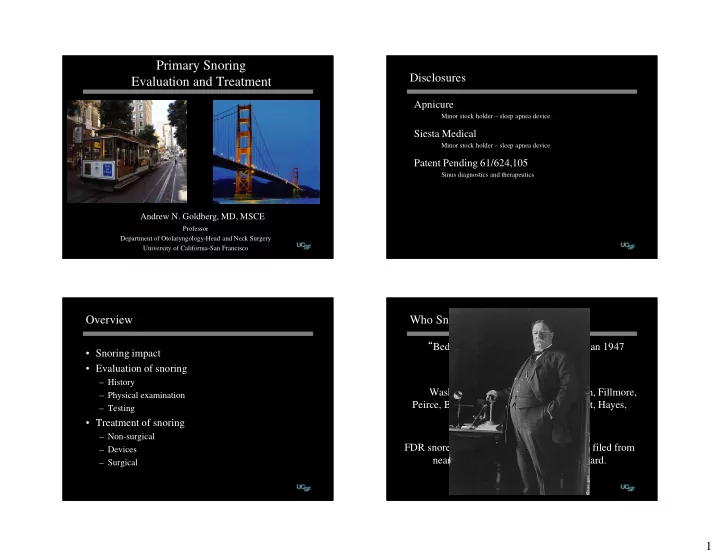

Primary Snoring Disclosures Evaluation and Treatment Apnicure Minor stock holder – sleep apnea device Siesta Medical Minor stock holder – sleep apnea device Patent Pending 61/624,105 Sinus diagnostics and therapeutics Andrew N. Goldberg, MD, MSCE Professor Department of Otolaryngology-Head and Neck Surgery University of California-San Francisco Overview Who Snored? “ Bedlam in the Boudoir ” J. Dugan 1947 • Snoring impact Washington, both Adams ’ , Van Buren, Fillmore, • Evaluation of snoring 20 out of 32 presidents snored: – History – Physical examination Peirce, Buchanan, Lincoln, Johnson, Grant, Hayes, – Testing Arthur, Cleveland, FDR • Treatment of snoring – Non-surgical FDR snored so loudly, that complaints were filed from – Devices nearly every patient on his hospital ward. – Surgical 1
How Loud is Loud? Measurement of Snoring • WHO rating / Schafer Thieme 1996 • No agreed upon method for measurement – Microphone, piezoelectric vibration, nasal pressure oscillations • Measurement of snoring by sleep technologists listeners • Calm breathing at 10 cm 25dB demonstrated a kappa of 0.49 (moderate) – Barely audible • Not clear what characteristic is important • Loud breathing at 1m 40 dB • “ Acoustic Pollution ” – Amplitude, frequency, intensity, duration – This is the threshold for snoring • Bed partner survery commonly used 55 dB – VAS scale most common, though others are used. • Loudest recorded 87.5 dB – As loud as a diesel engine in a Greyhound bus Snoring Etiology The Impact of Snoring • Incidence of habutual snoring Knuiman Chest 2006 • Starling resistor theory – Men 35 - 45 % – Increased resistance at the nose causes collapse downstream – Women 15 - 28% • Risk factors Tishler JAMA 2003 – Increasing age, maleness, obesity, alcohol, sedative use, nasal obstruction • Effects Marin Lancet 2005 – No excess cardiovascular risk after 10 years • Vibration Cho Sleep 2011 – Vibration model in rabbits demonstrated endothelial damage from vibration separate from respiratory effects 2
Treatment Effects Non-Surgical Approaches • Patient Effects • Position Therapy – Reduction in Epworth Sleepiness Scale • Weight Loss – ? Influence on stroke • Singing? • Bed Partner Effects • Medical Treatment of Nasal Obstruction – Improved depression score (BDI) Uloza Sleep Breath 2010 – Improved sleep quality Blumen Eur Respir J 2009 • % light sleep, arousal index lower Device Approaches Device Approaches • Mandibular Repositioning Device • Essential Oils for snoring Prichard Physio Res 2004 – Snoring reduction – 82% in treatment group – 44% in placebo 3
Snoring Pillows Snoring Aids • Cervical Positioning • Prospective randomized study Kushida Sleep Res Online 1999 Michaelson Oto HNS 2004 • Improved snoring and apnea significantly • Oral spray lubricant, Breathe Rite, Snore no more pillow • No significant subjective or objective effect • Patients with and without OSA 4
Surgical Approaches Nasal Procedures • Nasal Procedures Varying ability to improve snoring – • Palatal Procedures • Tongue Procedures (you already heard about this…) – None indicated for snoring alone Palatal Procedures Injection Snoreplasty • Palatal Stiffening Procedures • Injection of sclerosing agent into soft palate – Injection Snoreplasty • Can reinject 6 weeks later in 2 lateral areas – Cautery Assisted Palatal Stiffening • 2cc of 3% Na tetradecyl sulfate • Snoring “ no longer a problem ” in 92% of cases – RF methods – Temp controlled, coblation • 1cc 2% lidocaine then 1cc 99% denatured alcohol – Pilar Implants • Reduction Procedures • First described by Strauss Arch Otolary 1943 ! – UP3, UPF, LAUP – Uvulectomy 5
Injection Snoreplasty Technique Cautery Assisted Palatal Stiffening (CAPSO) • Use of cautery in the office to denude palatal mucosa and create scar • CAPSO Mair Oto HNS 2000 • Modified CAPSO Pang Oto HNS 2007 – VAS 8.3 – 3.3 after 3 months – 13/13 with improvement CAPSO technique CAPSO technique 6
Radiofrequency Ablation Pillar Implants • Temperature Controlled v. Coblation • Insertion of 3 Dacron foreign bodies creating fibrotic reaction • Numerous studies with improvement • Short term effectiveness in many studies • Both with moderate effect • QOL, snoring, AHI improved • Recurrence in 75% - satisfaction 25% – Friedman Oto HNS 2006 – Hultcranz Eur Arch Otolar 2010 – Walker Oto HNS 2007 • Study of 77 patients s/p RFA with 6 year follow up – Gillespie Oto HNS 2009 – Bed partner relapse in 92.7 cases – VAS pre-op 8.1 post op 3.5 follow up 5.7 – DeKermadec Eu j oto 2014 Pillar Implants Pillar Implants • One long term study Rotenberg Lar 2012 • Prospective cohort study – No change in BMI, minimal extrusion • At 1 year, 95% would recommend to a friend • At 4 years, only 22% would recommend to a friend 7
Laser-Assisted Uvulopalatoplasty (LAUP) Laser Assisted Uvulopalatoplasty (LAUP) Description • Serial re-shaping of soft palate – can reduce size of tonsils • Typically done in office setting • Serial sessions (1-4) usually at least 6 weeks apart • Surgeon can “fish mouth” uvula by reducing central bulk • “French” or “Brittish” method – “British” method involves ablation of mucosa of anterior soft palate (similar to injection snoreplasty) • Application of Kenalog in Orobase decreases pain Li Lasers Surg Med 2011 • Can also use CO2, KTP, Argon (electrocartery, etc) LAUP Stage II LAUP vs. UP3 Osman 2003, Prasad 2003 • Can add “ Brittish ” central lesion UP3 LAUP • Revise trenches if needed Improvement in Snoring 89% 83% Short term Improvement in Snoring 83% 76% Long term Snoring abolished 19% 15% Snoring a lot better 58% 28% No longer separate 81% 66% 8
Conclusions • Snoring is a prevalent condition that effects quality of life, social interaction, and possibly health • Behavioral, medical, and surgical interventions can improve snoring with varying success • More work needs to be done to define the physiologic and health effects to put snoring into perspective with respect to treatment in the health care system 9
Recommend
More recommend